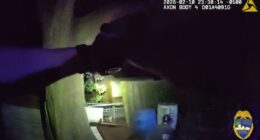Share this @internewscast.com
Drivers are being cautioned about the possibility of facing a £1,000 fine if they neglect to inform the DVLA about certain medical conditions. While some health issues may not necessitate notifying the licensing agency, others might require motorists to cease driving or even surrender their license, either temporarily or permanently.
Failure to disclose relevant medical conditions not only has the potential to affect one’s driving abilities but also poses a risk to public safety. The DVLA emphasizes, “It is essential to inform the DVLA about specific medical conditions as they can influence your driving capabilities. Not reporting a medical condition that impacts your driving could result in a fine of up to £1,000.”
There are instances where drivers may need to voluntarily relinquish their licenses, while in other cases, the DVLA will determine if a driver can retain their license. The agency advises, “You have the option to voluntarily surrender your license. This decision might be appropriate if, for example, a medical condition affects your driving.”
Drivers must notify the DVLA and submit their license if they have a medical condition that impacts their ability to drive. Failing to voluntarily surrender your license under these circumstances requires informing the DVLA, who will then assess whether you can continue to hold a driving license.
- your doctor tells you to stop driving for 3 months or more
- your medical condition affects your ability to drive safely and lasts for 3 months or more
- you do not meet the required standards for driving because of your medical condition
The DVLA has published a comprehensive list of 118 medical conditions that drivers are required to declare to avoid incurring fines. This list is available in alphabetical order for reference.
The DVLA has confirmed a list of 118 conditions all drivers must declare to avoid being fined. This is the complete list in alphabetical order.
- Absence seizures – you must declare any epileptic seizures or blackouts and stop driving immediately
- Acoustic neuroma – you must declare if you experience sudden and disabling dizziness. Speak to a doctor if you’re unsure if your acoustic neuroma causes other symptoms affecting your driving or if you must tell DVLA about them
- Agoraphobia – ask your doctor if agoraphobia affects your driving
- Alcohol problems
- Alzheimer’s disease
- Amyotrophic Lateral Sclerosis (ALS)
- Amaurosis fugax – stop driving for at least one month after a transient ischaemic attack (TIA) or mini-stroke and restart when the doctor tells you it’s safe
- Amputations – You must declare any amputated limb
- Angiomas or cavernomas
- Ankylosing spondylitis – speak to your doctor if it affects your driving
- Anxiety – check with your doctor if anxiety affects your ability to drive safely
- Aortic aneurysm – you must declare if your aortic aneurysm is 6cm or more in diameter. If your aortic aneurysm is 6.5 cm or more in diameter, you must not drive
- Arachnoid cyst
- Arrhythmia – you must report your arrhythmia if you have distracting or disabling symptoms or if your condition means you cannot safely stop or control the car
- Arteriovenous malformation
- Arthritis – you need to report this if you use special controls for driving
- Asperger syndrome -you must declare if your autistic spectrum condition affects your ability to drive safely
- Ataxia
- ADHD – you must declare if your ADHD or ADHD medication affects your driving
- AIDS
- Bipolar disorder (manic depression)
- Blackouts – ask your doctor if your blackouts, fainting or loss of consciousness affects your ability to drive
- Blood clots – these must be declared if it is in your brain but not if it is in your lungs
- Blood pressure – declare this if you treatment affects the way you driving
- Brachial plexus injury
- Brain abscess, cyst or encephalitis
- Brain aneurysm
- Brain haemorrhage
- Traumatic brain injury
- Brain tumour – your doctor might tell you to surrender your licence
- Broken limbs – you need to declare if you cannot drive for over three months because of a broken limb
- Brugada syndrome
- Burr hole surgery – you must declare if you’ve had surgery to remove a clot from around your brain
- Cancer -you must report if you develop problems with your brain or nervous system, your doctor says you might not be fit to drive, you’re restricted to certain types of vehicles or vehicles that have been adapted for you or your medication causes side effects which could affect your driving
- Cataracts – you must declare only if this condition affects both your eyes
- Cataplexy
- Central venous thrombosis – you need to declare only if you still have problems one month after central venous thrombosis.
- Cerebral palsy
- Charcot-Marie-Tooth disease (CMT)
- Cognitive problems
- Congenital heart disease
- Fits, seizures or convulsions
- Déjà vu – this must be declared if you are having seizures or epilepsy causing déjà vu
- Defibrillators – only if you have an implanted defibrillator, also known as an ‘ICD’
- Dementia
- Depression – you must declare if your depression affects your ability to drive safely
- Diabetes – you must declare if your insulin treatment lasts over three months, you had gestational diabetes, and your insulin treatment lasts over three months after the birth, you get disabling hypoglycaemia, or a medical professional has told you that you’re at risk of developing it
- Diplopia (double vision)
- Dizziness or vertigo – you need to declare if you experience sudden, disabling or recurrent dizziness
- Drug use – declare it if you’ve used illegal drugs or misused prescription drugs
- Eating disorder – you must declare if your eating disorder affects your ability to drive safely
- Empyema (brain)
- Essential tremor – you must declare if your essential tremor affects your driving ability
- Eye conditions – only if both eyes are affected
- Guillain Barré syndrome
- Serious head injuries
- Heart attacks – you don’t need to declare if you’ve had a heart attack (myocardial infarction) or a heart, cardiac or coronary angioplasty. However, you should stop driving for – one week if you had an angioplasty, it was successful, and you don’t need any more surgery, four weeks if you had angioplasty after a heart attack but it wasn’t successful or four weeks if you had a heart attack but didn’t have angioplasty
- Heart failure – you must declare your heart failure if symptoms affect your ability to drive safely, distract you while driving or happen at rest
- Heart palpitations
- Hemianopia
- Hodgkin’s lymphoma – you need to report if you develop problems with your brain or nervous system, your doctor says you might not be fit to drive, you’re restricted to certain types of vehicles or vehicles that have been adapted for you or your medication causes side effects which could affect your drivin
- Huntington’s disease
- Hydrocephalus – only if you have hydrocephalus with symptoms
- Hypoglycaemia
- Hypoxic brain damage
- Intracerebral haemorrhage – you must declare if you still have problems a month after an intracerebral haemorrhage
- Korsakoff’s syndrome
- Labyrinthitis – you must declare if you have labyrinthitis symptoms for three months or more
- Learning disabilities – you need to report any learning disabilities however not learning difficulties such as dyslexia
- Lewy body dementia
- Limb disability
- Long QT syndrome
- Lung cancer – only if you are affected by any of the following: problems with your brain or nervous system, your doctor says you might not be fit to drive, you’re restricted to certain types of vehicles or vehicles that have been adapted for you or your medication causes side effects which could affect your driving
- Lymphoma – only if you develop problems with your brain or nervous system, your doctor has expressed concerns about your fitness to drive, you can only drive a specially adapted vehicle or a specific type of vehicle, or your medication causes side effects that might make it unsafe for you to drive
- Marfan’s syndrome
- Medulloblastoma
- Meningioma – only if it affects your ability to drive safely
- Motor neurone disease
- Muscular dystrophy
- Myasthenia gravis
- Myoclonus
- Narcolepsy
- Night blindness












